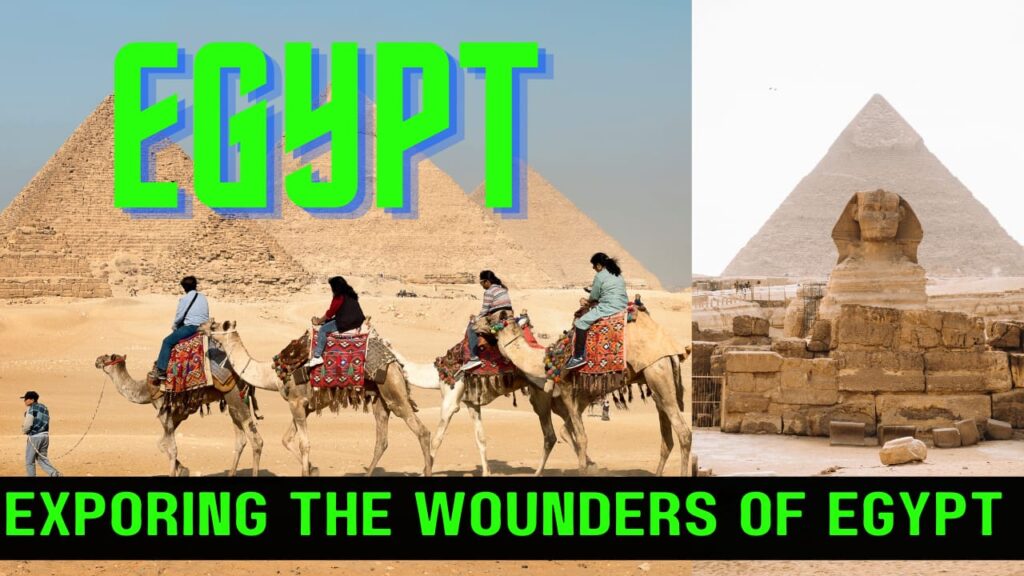Exploring the Wonders of Egypt: A Timeless Journey

Egypt: A Glimpse into Ancient Marvels
Egypt, a land steeped in history and mystique, stands as a testament to the grandeur of human civilization. From the colossal pyramids to the majestic Nile River, every inch of this country whispers tales of a bygone era. The allure of Egypt lies not only in its ancient wonders, but also in the vibrant culture that continues to thrive amid this rich historical tapestry.
Unraveling the Enigma of the Pyramids
The iconic pyramids of Egypt, including the Great Pyramid of Giza, are synonymous with ancient Egyptian ingenuity. Built as eternal resting places for pharaohs, these architectural marvels have stood the test of time, leaving visitors in awe of the precision and expertise of their construction. The mysteries surrounding their creation continue to fascinate scholars and tourists alike, making the pyramids an enduring symbol of Egypt.
The Timeless Flow of the Nile
The Nile River, often referred to as the lifeblood of Egypt, weaves through the landscape, bestowing fertility and sustenance to the region. Its fertile banks have nurtured civilizations for millennia, allowing Egypt to flourish in the midst of arid surroundings. Cruising down the Nile offers a unique perspective on the country, providing glimpses of both ancient ruins and modern life along its banks.
Cairo: Where History and Modernity Converge
As the vibrant capital of Egypt, Cairo serves as a vibrant hub where the past and present coexist harmoniously. The bustling markets of Khan El Khalili stand in contrast to the ancient wonders of the Egyptian Museum, housing priceless artifacts from pharaonic times. The city’s energy is infectious, offering a lively introduction to the complexities of modern Egyptian life.
Diving into the Depths of the Red Sea
Beyond its historical treasures, Egypt boasts a world-class destination for underwater enthusiasts. The Red Sea’s azure waters teem with a kaleidoscope of marine life and vibrant coral reefs, making it a diver’s paradise. Whether exploring the vibrant reefs of Hurghada or the serene depths of Dahab, Egypt’s Red Sea coast promises an unforgettable underwater adventure.
Preserving the Legacy: Conservation Efforts in Egypt
In recent years, Egypt has taken significant strides in preserving its invaluable historical heritage. Initiatives and policies have been implemented to safeguard ancient sites from degradation and illegal excavation. Museums and institutions are working tirelessly to conserve artifacts and educate the public about their cultural significance, ensuring that Egypt’s legacy endures for generations to come.
In conclusion, Egypt beckons travelers with a potent blend of ancient allure and modern vitality. Its pyramids, Nile, bustling cities, and underwater treasures offer a kaleidoscope of experiences that cater to history enthusiasts, adventure seekers, and culture lovers alike. A journey to Egypt is not merely a trip; it is an immersion into a timeless narrative that continues to captivate the world.
Frequently asked questions (FAQs)
Q1: What is Egypt known for?
- A1: Egypt is renowned for its ancient civilization, including the pyramids, Sphinx, and rich cultural heritage. It’s also famous for the Nile River, the Red Sea, and historical cities like Cairo.
Q2: What are the major attractions in Egypt?
- A2: Some of the must-see attractions in Egypt include the Giza Pyramids, Luxor’s ancient temples, the Egyptian Museum in Cairo, cruising the Nile, and exploring the vibrant markets.
Q3: When is the best time to visit Egypt?
- A3: The best time to visit Egypt is during the cooler months from October to April, when temperatures are milder and outdoor activities are more comfortable.
Q4: Is it safe to travel to Egypt?
- A4: Yes, Egypt is generally considered safe for tourists. However, it’s advised to stay updated on travel advisories and follow local guidelines, especially in certain regions.
Q5: What languages are spoken in Egypt?
- A5: Arabic is the official language of Egypt. English is also widely understood, especially in tourist areas and major cities.
Q6: What currency is used in Egypt?
- A6: The currency used in Egypt is the Egyptian Pound (EGP).
Q7: What are some traditional Egyptian dishes to try?
- A7: Some popular Egyptian dishes include Koshari (a mixed rice and lentil dish), Ful Medames (fava beans), and various grilled meats and kebabs. Don’t forget to try Egyptian desserts like Basbousa and Umm Ali.
Q8: How do I get around in Egypt?
- A8: In Egypt, you can get around using taxis, local buses, and trams in cities. Tourists also often use guided tours, private drivers, and domestic flights for longer distances.
Q9: What should I wear when visiting Egypt?
- A9: It’s recommended to dress modestly, especially when visiting religious sites. Loose-fitting clothing that covers shoulders and knees is advisable. Comfortable, breathable fabrics are also essential due to the warm climate.
Q10: Are there any cultural customs I should be aware of in Egypt?
- A10: Yes, it’s polite to greet people with a friendly “As-salamu alaykum” (peace be upon you). Avoid public displays of affection, especially in more conservative areas. Also, ask for permission before taking photos of individuals, especially locals.
